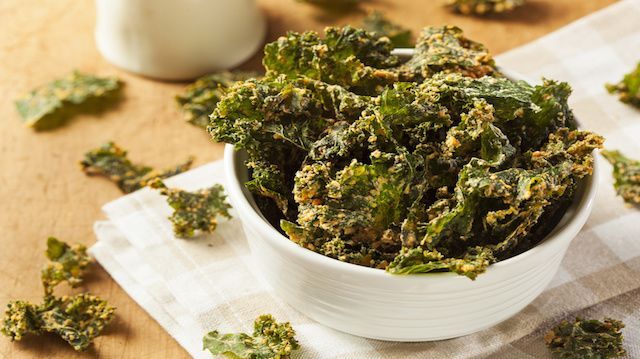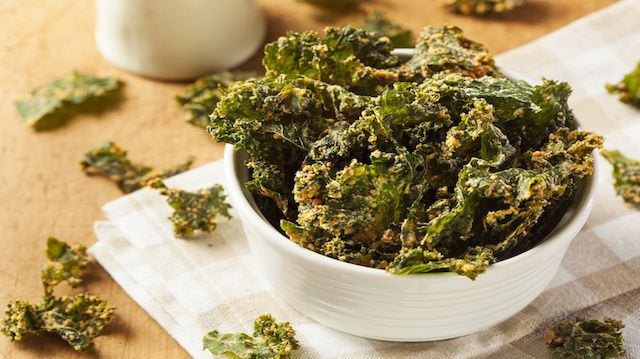
There’s no denying it: potato chips are a delicious guilty pleasure. Unfortunately, they are starchy, high-glycemic snacks that are high in sodium and full of hydrogenated, genetically-modified oils. Although there are healthier baked versions, they still fall high on the glycemic index. Fortunately, you can enjoy crisp, pop-in-your-mouth treats that will satisfy your need for chips without worrying about your health. These chips are truly guilt-free and are safe for diabetics and people who suffer from food allergies.
Kale chips
This veggie chip has taken the health world by storm! Kale is a highly nutritious leafy green that when baked is crispy and tastes like a thinly-sliced potato chip. Although you can buy them at a grocery store or health-food store, they might have some preservatives in them. The safest way to ensure your kale is organic and preservative-free is to make your own kale chips. Wash and pat dry your kale leaves. Pull the leaves off the stem and toss them in 1–2 tablespoons of olive oil and salt to taste. Pop them in the oven at 350 degrees Fahrenheit for roughly 10–15 minutes or until crispy.
Sweet potato chips
Although this is a type of potato chip, it is made with a less starchy, lower-glycemic potato. An average russet potato has a glycemic index (GI) of 111, while the sweet potato has a GI of 70. Although 70 is still relatively high, it is a safer alternative for those with diabetes or on a low-carb diet. Prepare these the same way you would make baked potato chips. Slice them thinly with a mandolin, oil and salt them, then put them in the oven at 350 degrees Fahrenheit for 10 minutes. Flip them and continue to cook them for another 5 to 10 minutes or until crunchy.
Beetroot chips
Beets are incredibly healthy for us, and yet many of us don’t like the taste of beets. If this is you, try making baked beetroot chips! Use a mandolin to get uniformly thin slices. Coat them in a teaspoon of olive oil and sea salt. Then throw them in the oven at 350 degrees Fahrenheit for 14 to 18 minutes. Don’t worry if they don’t appear to be crunchy enough. They will continue to harden as they cool to room temperature. I admit it, I’m not a big beet person myself, but I love beetroot chips!
Plantain chips
Plantains are large, banana-like fruit that are often fried in Latin cuisine. You can make a healthier version by baking them into chips! Remove the peel, slice them into strips or rounds, lightly brush them with olive oil on both sides and place into an oven at 350 degrees Fahrenheit for 20–25 minutes.
Banana chips
Although dried fruit has a bad reputation for being full of excess sugar and calorie dense, if you make them yourself and don’t add more sugar or oil, you can control the calories and still enjoy the punch of fiber and vitamins that dried fruit has to offer. Although they are much sweeter than potatoes, bananas have a glycemic index of 62, roughly half of the GI of a russet potato! Banana chips can be made with lemon juice instead of oil to keep calories in check and offer additional health benefits. For each banana, use 1.5 teaspoons of lemon juice and coat each slice. Bake on parchment paper at a low 225 degrees Fahrenheit for roughly two hours or until crispy.
Taro chips
Taro is an Asian root vegetable that is low in calories and high in fiber. It’s an ingredient often found in Asian cuisine in both sweet and savory dishes. To make chips from taro root, use a mandolin to slice them very thinly. Brush both sides of each chip with a thin layer of olive oil. Heat the oven to 400 degrees Fahrenheit and leave the chips in the oven for roughly 15 minutes or until the edges are lightly browned. Remove from the oven and immediately sprinkle sea salt to taste as the taro chips cool and crisp.
Eggplant chips
 Eggplants are rich in natural carbohydrates and vitamins B1, B6 and C. This root vegetable can be cut into long, narrow strips or sliced into large, round chips. It’s delicious either way. Once you slice your eggplant, place each slice on parchment paper or another nonstick surface. Sprinkle sea salt and wait an hour until the water from the eggplant has been drawn out. Dab with a paper towel to remove the excess water. Preheat the oven to 350 degrees Fahrenheit and brush olive oil on both sides of each chip. Place in the oven for about 20 to 30 minutes.
Eggplants are rich in natural carbohydrates and vitamins B1, B6 and C. This root vegetable can be cut into long, narrow strips or sliced into large, round chips. It’s delicious either way. Once you slice your eggplant, place each slice on parchment paper or another nonstick surface. Sprinkle sea salt and wait an hour until the water from the eggplant has been drawn out. Dab with a paper towel to remove the excess water. Preheat the oven to 350 degrees Fahrenheit and brush olive oil on both sides of each chip. Place in the oven for about 20 to 30 minutes.
Carrot chips
Carrot chips are a fun way to get your kids to enjoy their vegetables. Carrots have a naturally sweet flavor that is enhanced when cooked. Despite being somewhat sweet, they only have a GI of 35! You can enhance this flavor further without spiking blood sugar with cinnamon and a dash of salt. To make carrot chips, slice carrots thinly into rounds or strips, coat with olive oil and bake for roughly 10 minutes at 425 degrees Fahrenheit.
Parsnip chips
Parsnips are another low-glycemic alternative, with a GI of 52. Preheat the oven to 350 degrees Fahrenheit. Slice the parsnips into thin rounds and toss in 1 tablespoon of olive oil. Sprinkle sea salt if desired. Crisp in the oven for 20 minutes, then flip and allow to continue cooking for another 15 minutes.
Zucchini or yellow squash chips
Since zucchini and yellow squash are so similar, I decided to lump these together. After all, you can prepare them the same way. Both have gained popularity recently as a whole-food pasta replacement in both spaghetti and lasagna dishes. Who knew they could replace potato chips? To make these crispy veggie treats, use a mandolin to get perfectly uniform slices. Lightly coat the slices with olive oil and salt. Bake at 250 degrees Fahrenheit for about an hour, or until crispy.
Apple and pear chips
Apple and pear chips are some of my favorites to make! Unlike dried apples, they aren’t chewy or soft. As with zucchini and yellow squash, it’s best to keep the temperature low to prevent burning. Turn your oven dial to 200 degrees Fahrenheit while you slice your apples and pears with a mandolin. Line a small plate with stevia and cinnamon. Toss your apple and pear slices in half a teaspoon of lemon juice, then dip each side of each slice in the stevia-cinnamon mixture. Line a pan with parchment paper and lay out your slices. Leave them in the oven for about an hour, or until the edges begin to ruffle. Then flip them and continue baking for another hour or until crispy. If the slices are thicker, then flip each hour for three to four hours, or until they have browned.
Coconut chips
This may sound weird, but coconut chips taste like low-glycemic buttery cookie crisps! Coconuts are full of healthy fats and are naturally sweet. Turn your oven to 400 degrees Fahrenheit. Poke two holes into the coconut using a skewer or ice pick to remove the coconut water. Brush olive oil on the bottom of a pan and place the coconut in the oven until the shell cracks, which will take roughly 15 minutes. Remove the shell and shave the coconut into long strips using a peeler. Lay out each strip onto the greased baking pan and bake for 10 minutes, flipping occasionally, or until lightly browned.
I hope these simple recipes can inspire you to choose healthier alternatives to traditional potato chips whenever the craving arises. These fruit and veggie chips are lower on the glycemic index, less starchy, and higher in vitamins and nutrients than traditional russet potatoes. When choosing an oil to use, olive oil and coconut oil are the healthiest options for baking. If you don’t want to use oil, use parchment paper and adjust cooking times accordingly. If you have enjoyed these recipes, let us know in the comments below. How did yours turn out and how would you tweak each recipe?
—Nicole Manuel
Nicole Manuel, CPC is a certified life coach with a degree in economics and over five years of professional writing experience. Her goal is to help others discover ways to incorporate sustainable solutions that can improve their health and well-being on a budget.
Sources:
http://www.health.harvard.edu/healthy-eating/glycemic_index_and_glycemic_load_for_100_foods
http://www.glycemicindex.com

